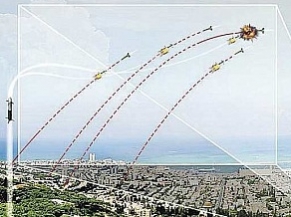|
World Jewish News

Anti-missile system Iron Dome, meant to protect Israeli towns from rocket attacks. Anti-missile system Iron Dome, meant to protect Israeli towns from rocket attacks. Anti-missile system Iron Dome, meant to protect Israeli towns from rocket attacks. Photo
|
Iron Dome missile defense system aces final test run
19.07.2010, Israel Israel's defense establishment on Monday completed its final series of experiments on the Iron Dome missile defense system, which could protect Israeli towns from short and medium-range missiles and rockets.
The Defense Ministry issued a statement explaining that the experiments, which included intercepting simultaneous rocket salvos, were completed successfully.
Two Iron Dome defense systems have so far been manufactured, and will become operational this coming November in the Israel Air Force anti-aircraft division.
U.S President Barack Obama in May asked Congress for $205 million to support the development of Iron Dome, which intercepts the type of rockets used by Palestinian
militants in Gaza and Hezbollah in Lebanon.
The defense establishment has not yet determined how many Iron Dome systems it will ultimately purchase from Rafael Advanced Defense Systems Ltd. - the manufacturer of the Iron Dome defense system.
The series of experiments was conducted in the Negev this week, on the heels of another successful run some six months ago.
Both Rafael and the Defense Ministry have voiced their satisfaction with the system's ability to intercept several rockets fired from different directions simultaneously. Iron Dome is capable of calculating the trajectory of an incoming rocket and can be programmed to refrain from taking counter action if the enemy rocket is expected to strike an unpopulated area.
Defense Minister Ehud Barak said Sunday that the completion of the experiments was an "important landmark for the defense establishment and the security industries that led the development of Iron Dome in such a short period of time and in an unparalleled fashion."
Senior U.S. State Department official Andrew Shapiro said last week that U.S. support for Iron Dome will, "provide Israel with the capabilities and the confidence that it needs to take the tough decisions ahead for a comprehensive peace."
Iron Dome uses small radar-guided missiles to blow up Katyusha-style rockets with ranges of between 5 km (3 miles) and 70 km (45 miles), as well as mortar bombs, mid-air.
Its development was spurred by the 2006 conflict in Lebanon with Hezbollah and the Gaza Strip war against Hamas 18 months ago, when those Israeli towns within range were all-but defenseless against the rockets.
The two units the Defense Ministry said will begin operating by November are truck-towed and easily deployed to any of Israel's borders.
Israel envisages Iron Dome becoming the lowest level of a multi-tier aerial shield capped by Arrow, a partly U.S.-funded system which shoots down ballistic missiles above the atmosphere.
Each Iron Dome interception is estimated to cost $10,000 to $50,000. Pitted against estimated costs of cruder Palestinian rockets, as low as $500, that could bleed the defense budget, some analysts have argued.
But Barak has brushed off such criticism, pointing out that if Israel were to go to war in retaliation for serious casualties in a rocket strike, the campaign would cost $1.5 billion a day.
The Defense Ministry has said the system may also be manufactured for export in the future.
By Amos Harel and Reuters
Haaretz.com
|
|
